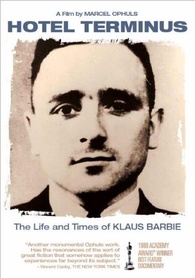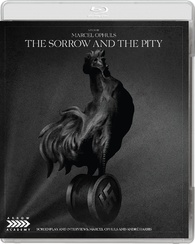I was surprised this magnificent documentary didn't have a thread already, but I always wanted to see this and picked it up several months ago from Arrow, only to put it on this weekend. I had tried to watch it before, right after I watched Claude Lanzmann's
Shoah (1985), but found at the time that I was taken aback by the density of information being delivered in French and German, so had to stop the film. Possibly, I had been drained by watching the 9 1/2 hour
Shoah, so this time, I was more fresh for Ophuls' lengthy work, and while I still don't think I got all of it, as Vichy France is not a subject with which I am well-acquainted, there will be other viewings for that. Ophuls' style draws you in in a similar way to Lanzmann, setting up a camera, asking questions and allowing the interview subject to respond at length, then cutting the interviews together so that they tell a long, gripping story. The time simply flies by and when it was over, I didn't want the documentary to end.
Arrow's release of
The Sorrow and the Pity presents the film in an HD master from Gaumont, in a 1.66:1 aspect ratio. The film is broken up into two distinct parts with their own short opening and closing credits sequences, each lasting roughly two hours. The film is mostly in French, but also has significant portions of English and German, and Arrow provides English subtitles for non-English dialogue only. Interestingly, subjects are identified with what look to be new HD graphics in English text. I have to say, I'm not wild about the aspect ratio choice that might have been made as a compromise for recent and HDTV broadcast.
The Sorrow and the Pity was originally meant to air on French TV in 1971 and only ended up airing in 1981, however it appears to have been shown in 1.33:1 as can be seen in archive footage in Arrow's extras. Apparently, video editions were then 1.66:1, but in the 1.66:1 HD master, the image often feels tight and in close-ups, the tops and bottoms of faces can be cut off. There is also significant wartime archive footage shown in the documentary, all of which would naturally be in a 4:3 ratio as well. Beyond the aspect ratio, the image looks fine for documentary footage, with obvious fluctuations when archive footage from the war is used. The LPCM Mono audio is fine and the subtitles do an admirable job with all the French and German dialogue. I noticed no errors, but Arrow's font could have been a bit bigger and bolder.
After the film was over, I dived into the extras. I was especially pleased to see that Arrow secured an episode of
Le Nouveau Vendredi which was given over to a debate that aired after the film was shown on French TV in 1981. In it, two French academics, along with Marcel Ophuls himself, discuss the film with a panel of 16-17 year-olds from Clermont-Ferrand, and it's pretty devastating how the discussion mirrors the same ones we have now, right down to discussions about the Holocaust itself, whether it actually happened, whether Jews and minority groups still suffer racism or whether that is over, and so on. One thing is clear, this panel of young people learned a lot about their own country, the Vichy government and the French resistance from watching the documentary, clips of which are shown again during the broadcast, and here in a 4:3 ratio, though I didn't look to see if the image was further cropped from 1.66:1 or if it had simply been presented as shot. Much of the program is given over to the students' musings and while that is fascinating, I would have liked to hear more from the academics and Ophuls as well and it would have been great if the program was double its hour-long length. This is encoded in upscaled 1080p23.976, which probably explains the run time of 62:07, which would be just under an hour at 25 fps.
The other extra is a 30-minute NFT interview with Ophuls conducted by critic Ian Christie in 2004, which appears to have been on Arrow's old DVD release. Unfortunately, I already don't remember much from this beyond that Ophuls has a keen sense of humor. I also remember that he was sat a bit far away from his standing microphone and so his voice can be a bit low. I fogot to check how this was encoded, sorry.
As detailed above, the first pressing also came with a booklet, but I missed out and didn't get one.
After this Arrow release, Milestone released
The Sorrow and the Pity in the US in 2023, but with different extras:
Quote:
- Marcel Ophuls Visual History (40 minutes, courtesy of Academy of Motion Picture Arts & Sciences, ©2017 A.M.P.A.S.)
- Re-release trailer
|
Perhaps I will pick that up during a sale.
I then went a little mad and watched Ophuls' Oscar-winning
Hotel Terminus: The Life and Times of Klaus Barbie (
Hôtel Terminus: Klaus Barbie, sa vie et son temps) (1988), which is sadly only available on DVD at the moment:

There was also a UK DVD from Simply Media in 2015, but they do not appear to be in operation any longer. There were / are also other PAL DVDs of the film in France and Germany, but the Icarus Films US DVD is the only option to watch the film in its proper speed. The US DVD appears to be sourced from elements owned by MGM (the film begins with an MGM 75th anniversary logo, which would put the master at 1999, while the PAL DVDs are also licensed from MGM and Hollywood Classics) and has French-language opening titles and opening and ending credits, but its languages are a mix of French, English, German and Spanish. Subjects are identified with a thin, electronic white font that is burned in, while English subtitles (which were provided by MGM and the National Captioning Institute) are unfortunately also burned in and in a thick, light yellow font that's easy to read. The translation itself is excellent, which is a relief as the documentary is again dense with important dialogue that must be properly understood. However, many times, these subtitles also include at least some captions, often indicating which language is being spoken or if the interviewer is speaking, and sometimes, you will notice a small white dot on the screen when English is being spoken. Towards the end of the documentary, the subtitles unfortunately also start coming on for English dialogue, too, but this only happens in a few scenes and then corrects itself. I wonder if the track was created primarily as English SDH, but then the decision was made to remove most of the English-language subtitling and burn-in the rest as an English translation track. Unlike
The Sorrow and the Pity,
Hotel Terminus was clearly meant to be experienced as one film, and there is an awkward stop telling the viewer it's the end of the first disc, then the second disc picks up the film immediately when played via its menu. While this must have been done to maximize the quality on the DVD format, the break probably could have been inserted with more care.
Shot on 35mm and presented in a 1.33:1 aspect ratio,
Hotel Terminus is quite nice looking. Some scenes have minor damage and a few interviews have severe scratches running down the image, something which I expect could be ameliorated now. The mono audio is fine and all interviews come through clearly. In this film, there is a much more equal division of French and English, to the point where I would struggle to pin down which language is in the majority without counting the lines of dialogue. There are also large chunks of German and probably a bit less Spanish, this last language being the only one for which Ophuls needs to bring along an interpreter.
I found
Hotel Terminus easier to follow than
The Sorrow and the Pity and even though it is longer, I appreciated (I hesitate to say "enjoyed") the viewing even more and the 267 minutes simply breezed by. Again, Klaus Barbie was simply a known Nazi to me, but I didn't know much else about his case, so the whole thing was really fascinating to me. As with
The Sorrow and the Pity, Ophuls does not show graphic wartime footage, but the incredibly important witness testimonies are chilling and really make you hope for a decisive ending to the documentary. There are also a number of then-contemporary figures interviewed who will leave you shaking your head.
Unfortunately, there are no extras on the US DVD (apparently a recent French DVD has a 19-minute analysis in French) but there is a color booklet with a reprint of Paula Span's 1989
Washington Post article "Marcel Ophuls: History's Testimony - The Documentary Filmmaker's Frustrating Pursuit of Answers to the Holocaust", as well as a short biography and partial filmography of Ophuls.
Hopefully, we can get a Blu-ray of
Hotel Terminus soon.





















 Linear Mode
Linear Mode

